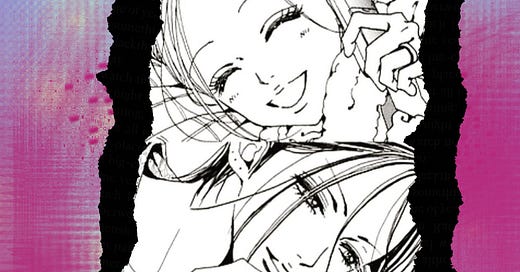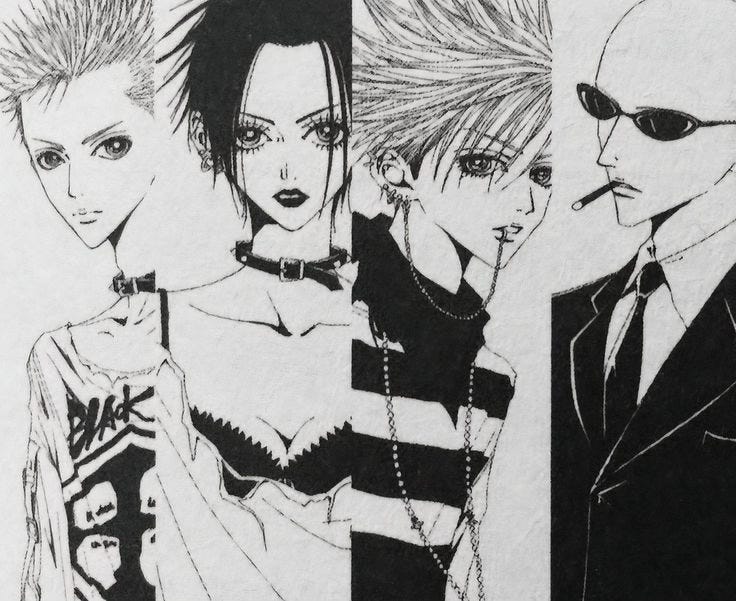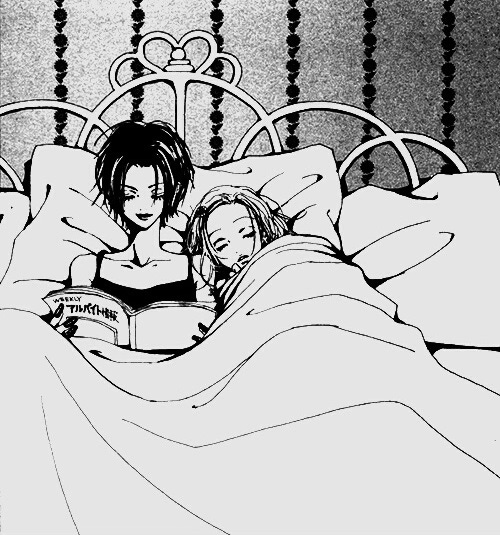I binged Nana before the term binging had resurrected its definition. I was captivated by the flamboyant protagonists and their affirmed y2k styling. The writer, Ai Yazawa—brandished her fashion background through the series itself, creating young adult characters with alternating wardrobes and personalities attached to their leopard overcoats—Nana felt uncontainable. Beyond its visual perks, the storyline is what made me stay. Nana being one of the few anime that masters a sincere rendering of adult women falling in and out of love, and how those positions aren’t always painted so favorably.
Anime itself has become less taboo in its recent years, where stories like Nana are able to resurface and spark the interests of a fresh audience—specifically with the resurgence of early 2000s pop culture. Nana was one of the first animes I had watched full through (the first being Sailor Moon, but I never saw it as an anime, just a really good cartoon). I watched Nana around the age of fifteen, a time where my love life could only be experienced through forms of fiction.
Nana was the story of two young women with the exact same name (✿Nana✿), both leaving their respective cities behind to start a new life in Tokyo. They met and connected on the train ride there, before encountering each other once again during a lease signing. Their story begins as roommates, two young woman dropped into the complexities of love, friendship, and career chasing.
Both Nana’s are well sketched contradictions of the other. Nana Osaki being the dark haired, punk rock, independent lead-lady for a band that I can only describe as kick-ass. That Nana is also financially responsible and finds herself in one consistent relationship throughout the series, but that relationship doesn’t pigeonhole her to being the front woman of a romance manga. She’s the Nana who wants to make a name for herself as a recording artist, despite the odds that are set against her.
Nana Komatsu comes from a modern day family home, but often seeks validation from her more levelheaded girl-friends. Her sense of fashion reflects what you would see a young woman of that time wearing—colorful frills, mini skirts and barrettes clipped into her hair. She’s often referred to as Hachikō, which is a historic Japanese dog, due to her ever-pleasing personality. She’s the friend who enjoys hosting because she likes to cook, and is also the friend that uses romantic relationships as a degree of escapism.
Naturally, I would want to exude everything that Punk Rock Nana is. She was always the Nana who was a bit aloof, but overly protective of the people she cared about. She was strong-willed, spunky, and infectious. Her man wanted her, and that spoke volumes in contrast to her counterpart’s love life, Hachikō.
From the start, it was clear that Hachikō sought after desire. No matter how big her friend group was, she identified as being an outcast when it came to love. Though she is the protagonist who moves to Tokyo in a stable relationship (and moves to Tokyo in hopes to further pursue that relationship), it felt she could never truly illustrate the person she wanted to be without the outline of romance. Crushes, Hook ups, dates and lovers—it all was a driving factor in the development of how Hachikō saw herself, and continues to lean into that distinctness throughout the show. It wasn’t until my second time around watching the series where I saw the dualities between both Hachikō and myself.
Even as I try to come across internet photos depicting Hachikō as her bubbly, fun-loving self, I could only discover images that summarize her more troubling moments, And, I can’t help but to think how I feel the same exact way.
I speak openly regarding my trust in love, and how I am someone who genuinely believes in all forms of love (I talk about it a lot more in this Substack). When believing in the success of romantic relationships in the way that I do, it’s hard to take precaution and make note of certain indicators. I’m going to be a good girlfriend because I want to be a good girlfriend because I believe in the love that we have, and once my sight is set on it, my word is tied to it. However, warning signs exist for that very reason and that is somewhere where Hachikō (and myself) consistently falls short.
My third time watching the series, I was able to resonate with Hachikō without feeling disdain. ✿Spoiler✿ but towards the end of anime, Hachikō finds herself in a dissatisfying relationship with a man who doesn’t love her at all. And, what’s more infuriating to the audience, is that Hachikō details that same assessment throughout their entire relationship. She is fully cognizant of her imbalanced romance, but allows herself to continue to accept that cheapened love—that’s what makes the anime so gut wrenching to watch, and made it even more difficult for me to accept.
My friend once told me that after so many failed romances, I continue to pick myself back up to try and find that person for me, and that in itself is admirable. I don’t always see my heartbreak as inspiring, but each one unveils something within me that I didn’t understand prior. When I was younger, it was easier to date because expectations were annulled and my eagerness was exaggerated—I wanted to date for the heck of it. Now that I’m leaving my twenties, that same eagerness that used to move me has slowed me down and forced me to consider otherwise. That was when I was finally able to watch the series for the fourth time and say Yeah, I am Hachikō.
Hachikō came close to a fully realized love—a rewarding love, but it was taken away by the mistakes of her past. My first time watching it, I hated the direction the show was taking, I cursed at the screen, I ranted with my friends because I saw the steady downfall of Hachikō’s life—a downfall that couldn’t be revived. I look back at it all now and think about the many times Hachikō spoke directly to the listener, letting us know that she had made the decision to allow herself to be someone’s chewed-up love.
Hachikō was always the character who I never wanted to be, but she always made the most sense to me. Without question, she was searching for a bit of herself in the connections she’s made, through both her friendships and through her romantic endeavors. I’ve adopted her story as my own, held it and coddled it for as long as I could. But, now that I look back on the mistakes I’ve made, the love I made, and the tears that have followed—I can finally say that I’m in a place where I can watch the series through the eyes of the other Nana.
—Jade, Founder of Papers Publishing
—
NANA by Ai Yazawa Available for Purchase and Watching








I didn't think I'd wake up today and read a personal essay on Nana that cut to my CORE! This made me realize so much of my frustration with Hachikō is perhaps self-directed.. whoops. Thank you so much for sharing <3
This has got me interested in watching this series!